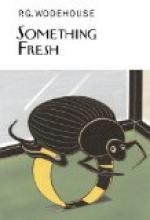In course of time he had done so. It might be that his absences from Sunday school in the cause of art had left him in later years a trifle shaky on the subject of the Kings of Judah, but his hard-won accomplishment had made him in request at every smoking concert at Oxford; and it saved the situation now.
“Have you ever heard two cats fighting in a back yard?” he inquired casually of his neighbor, Miss Willoughby.
The next moment the performance was in full swing. Young Master Waffles, who had devoted considerable study to his subject, had conceived the combat of his imaginary cats in a broad, almost Homeric, vein. The unpleasantness opened with a low gurgling sound, answered by another a shade louder and possibly more querulous. A momentary silence was followed by a long-drawn note, like rising wind, cut off abruptly and succeeded by a grumbling mutter. The response to this was a couple of sharp howls. Both parties to the contest then indulged in a discontented whining, growing louder and louder until the air was full of electric menace. And then, after another sharp silence, came war, noisy and overwhelming.
Standing at Master Waffles’ side, you could follow almost every movement of that intricate fray, and mark how now one and now the other of the battlers gained a short-lived advantage. It was a great fight. Shrewd blows were taken and given, and in the eye of the imagination you could see the air thick with flying fur. Louder and louder grew the din; and then, at its height, it ceased in one crescendo of tumult, and all was still, save for a faint, angry moaning.
Such was the cat fight of Master Eddie Waffles; and Ashe, though falling short of the master, as a pupil must, rendered it faithfully and with energy.
To say that the attention of the company was diverted from Mr. Judson and his remarks by the extraordinary noises which proceeded from Ashe’s lips would be to offer a mere shadowy suggestion of the sensation caused by his efforts. At first, stunned surprise, then consternation, greeted him. Beach, the butler, was staring as one watching a miracle, nearer apparently to apoplexy than ever. On the faces of the others every shade of emotion was to be seen.
That this should be happening in the steward’s room at Blandings Castle was scarcely less amazing than if it had taken place in a cathedral. The upper servants, rigid in their seats, looked at each other, like Cortes’ soldiers—“with a wild surmise.”
The last faint moan of feline defiance died away and silence fell on the room. Ashe turned to Miss Willoughby.
“Just like that!” he said. “I was telling Miss Willoughby,” he added apologetically to Mrs. Twemlow, “about the cats in London. They were a great trial.”
For perhaps three seconds his social reputation swayed to and fro in the balance, while the company pondered on what he had done. It was new; but it was humorous—or was it vulgar? There is nothing the English upper servant so abhors as vulgarity. That was what the steward’s room was trying to make up its mind about.




